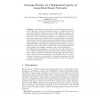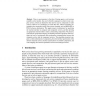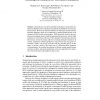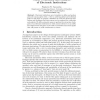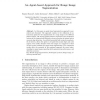CIA
2006
Springer
14 years 3 months ago
2006
Springer
Intelligent coordination in complex multi-agent environments requires sophisticated mechanisms for suboptimal task decomposition and efficient resource allocation provided by the t...
CIA
2006
Springer
14 years 3 months ago
2006
Springer
Large-scale sensor networks are becoming more present in our life then ever. Such an environment could be a cellular network, an array of fire detection sensors, an array of solar ...
CIA
2006
Springer
14 years 3 months ago
2006
Springer
There is great promise in the idea of having agent or web services available on the internet, that can be flexibly composed to achieve more complex services, which can themselves t...
E4MAS
2004
Springer
14 years 3 months ago
2004
Springer
Abstract. Decentralised, event-driven distributed simulation is particularly suitable for modelling systems with inherent asynchronous parallelism, such as agentbased systems. Howe...
DALT
2004
Springer
14 years 3 months ago
2004
Springer
Electronic institutions are a formalism to define and analyse protocols among agents with a view to achieving global and individual goals. In this paper we propose a definition of ...
DALT
2004
Springer
14 years 3 months ago
2004
Springer
Systems of autonomous agents providing automated services over the Web are fast becoming a reality. Often these agent systems are constructed using procedural architectures that pr...
ATAL
2006
Springer
14 years 3 months ago
2006
Springer
Natural, technological and man-made disasters are typically followed by chaos that results from an inadequate overall response. Three separate levels of coordination are addressed ...
ATAL
2006
Springer
14 years 3 months ago
2006
Springer
Abstract. In this paper an agent-based segmentation approach is presented and discussed. The approach consists in the utilization of autonomous agents for the segmentation of a ran...
ATAL
2006
Springer
14 years 3 months ago
2006
Springer
Abstract. This paper proposes a novel method to characterize the performance of autonomous agents in the Trading Agent Competition for Supply Chain Management (TAC-SCM). We create ...
ATAL
2006
Springer
14 years 3 months ago
2006
Springer
Abstract. Online reputation mechanisms need honest feedback to function effectively. Self interested agents report the truth only when explicit rewards offset the cost of reporting...

